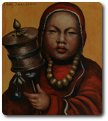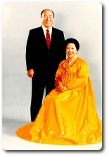The Handmaid's Tale Contents
- Interpretation and the opening epigraphs
- Section 1: Night - Chapter one
- Section 2: Shopping - Chapter two
- Section 2: Shopping - Chapter three
- Section 2: Shopping - Chapter four
- Section 2: Shopping - Chapter five
- Section 2: Shopping - Chapter six
- Section 3: Night - Chapter seven
- Section 4: Waiting room - Chapter eight
- Section 4: Waiting room - Chapter nine
- Section 4: Waiting room - Chapter ten
- Section 4: Waiting room - Chapter eleven
- Section 4: Waiting room - Chapter twelve
- Section 5: Nap - Chapter thirteen
- Section 6: Household - Chapter fourteen
- Section 6: Household - Chapter fifteen
- Section 6: Household - Chapter sixteen
- Section 6: Household - Chapter seventeen
- Section 7: Night - Chapter eighteen
- Section 8: Birth Day - Chapter nineteen
- Section 8: Birth Day - Chapter twenty
- Section 8: Birth Day - Chapter twenty-one
- Section 8: Birth Day - Chapter twenty-two
- Section 8: Birth Day - Chapter twenty-three
- Section 9: Night - Chapter twenty-four
- Section 10: Soul scrolls - Chapter twenty-five
- Section 10: Soul scrolls - Chapter twenty-six
- Section 10: Soul scrolls - Chapter twenty-seven
- Section 10: Soul scrolls - Chapter twenty-eight
- Section 10: Soul scrolls - Chapter twenty-nine
- Section 11: Night - Chapter thirty
- Section 12: Jezebel's - Chapter thirty-one
- Section 12: Jezebel's - Chapter thirty-two
- Section 12: Jezebel's - Chapter thirty-three
- Section 12: Jezebel's - Chapter thirty-four
- Section 12: Jezebel's - Chapter thirty-five
- Section 12: Jezebel's - Chapter thirty-six
- Section 12: Jezebel's - Chapter thirty-seven
- Section 12: Jezebel's - Chapter thirty-eight
- Section 12: Jezebel's - Chapter thirty-nine
- Section 13: Night - Chapter forty
- Section 14: Salvaging - Chapter forty-one
- Section 14: Salvaging - Chapter forty-two
- Section 14: Salvaging - Chapter forty-three
- Section 14: Salvaging - Chapter forty-four
- Section 14: Salvaging - Chapter forty-five
- Section 15: Night - Chapter forty-six
- Historical notes
- Human relationships in The Handmaid's Tale
- Mothers and children in The Handmaid's Tale
- Individualism and identity in The Handmaid's Tale
- Doubling in The Handmaid's Tale
- Gender significance and feminism in The Handmaid's Tale
- Power in The Handmaid's Tale
- Survival in The Handmaid's Tale
- Hypocrisy in The Handmaid's Tale
- Myth and fairy tale in The Handmaid's Tale
- Structure and methods of narration
Religious perspectives in The Handmaid's Tale
Quakers
In chapter 38 Moira tells Offred how she was helped to escape by a family of Quakers. The Quakers, or Society of Friends, are members of a Christian society which began in England in the seventeenth century, founded by George Fox. Quakers have been active in working to abolish slavery and in promoting equal rights for women.
More on Quakers: Quakers believe that they can experience God without the need for clergy. They often meet in silent worship and are pacifists. Throughout their existence, they have been subjected to persecution, and when religious dissidents left England to live in Massachusetts, Quakers were banished from among them. William Penn, a leading Quaker, founded Pennsylvania as a safe place for Friends.
Libertheos - Liberation Theology
Liberation Theology began in South America in the 1950s as a movement in the Catholic Church as a reaction against the poverty and social inequality endured by many people. It was also seen by many as a reaction against the hierarchical nature of the Catholic Church and has been criticised for its Marxist values as well as applauded for its support of the poor and underprivileged.
The followers of Liberation Theology saw Jesus Christ as supporting the poverty-stricken and oppressed by bringing the ‘sword' of social unrest, based on Christ's words in Matthew 10:34, ‘I did not come to bring peace, but a sword'. Supporters of the movement felt that priests should help to bring about radical social change, and many became involved in trade union movements.
In chapter 5 of The Handmaid's Tale, Atwood imagines Central America being taken over by members of the Liberation Theology movement - whom she calls ‘Libertheos'. Their anti-hierarchical beliefs and desire to liberate the oppressed put them on an inevitable collision course with the repressive hierarchical theocracy of Gilead.
Prayer wheels
In chapter 27 of The Handmaid's Tale, Offred and Ofglen walk past the shop called ‘Soul Scrolls'. Here machines churn out rolls of paper supposedly containing prayers, which Offred and Ofglen admit to each other are, in their opinion, completely useless because they are not personal nor meant.
Atwood is showing here how Gilead takes a belief which is deeply held by another religion and tries to use it - in vain, because it has no real meaning for anyone in Gilead.
 In Tibet, however, Buddhists believe strongly in the power of Prayer Wheels. Mantras, or prayers, are written out and affixed to prayer wheels held and spun by individuals, whose faith is that this is an effective alternative to oral recitation. Although there are larger wheels, the small ones held by individuals are by far the most common, and the fact that believers carry and spin the wheels for hours at a time shows their devotion and spiritual engagement - the opposite of the Soul Scrolls in The Handmaid's Tale where people pay to set the machines going but have no further involvement or interest in the ‘prayers'.
In Tibet, however, Buddhists believe strongly in the power of Prayer Wheels. Mantras, or prayers, are written out and affixed to prayer wheels held and spun by individuals, whose faith is that this is an effective alternative to oral recitation. Although there are larger wheels, the small ones held by individuals are by far the most common, and the fact that believers carry and spin the wheels for hours at a time shows their devotion and spiritual engagement - the opposite of the Soul Scrolls in The Handmaid's Tale where people pay to set the machines going but have no further involvement or interest in the ‘prayers'.
Holy Rollers
‘Holy Rollers' are Pentecostal Christians, usually in the United States of America, who, following the description in Acts 2:1-8, speak in tongues when moved by the Holy Spirit, sometimes rolling around the floor when so inspired - hence their name.
Although they attract derision from some people, and can be regarded as merely uncontrolled, such Christians are deeply committed. Atwood is being ironic therefore when she uses the term in chapter 27 of The Handmaid's Tale, where the ‘rollers' are not people inspired by spiritual passion but merely, as Offred says, a ‘disrespectful nickname' for the mechanisms known as ‘Soul Scrolls' - soulless machines which churn out meaningless ‘prayers'.
The Moonies
 The term ‘Moonies' is a popular term (though often seen as derogatory by those it refers to) denoting a member of the Unification Church led by the Korean Sun Myung Moon, who has claimed to be the Messiah. The Unification Church is a movement which (especially in America, where Moon went to live in 1971), has been accused of being a cult which brain-washes its followers, who are often young people, into complete subservience. In 1982, Moon, who owns several important businesses in America, was sent to prison for eighteen months for submitting false tax returns, but his followers view this as the result of conspiracy against him.
The term ‘Moonies' is a popular term (though often seen as derogatory by those it refers to) denoting a member of the Unification Church led by the Korean Sun Myung Moon, who has claimed to be the Messiah. The Unification Church is a movement which (especially in America, where Moon went to live in 1971), has been accused of being a cult which brain-washes its followers, who are often young people, into complete subservience. In 1982, Moon, who owns several important businesses in America, was sent to prison for eighteen months for submitting false tax returns, but his followers view this as the result of conspiracy against him.
Sun Myung Moon often holds mass wedding ceremonies, which may well have suggested the idea of the Prayvaganza depicted by Atwood in chapter 34 of The Handmaid's Tale. In 1982 he held a mass wedding of 2,075 couples at Madison Square Garden in New York. The participants' partners are usually chosen by Moon himself - as Atwood says of the Prayvaganza, ‘The marriages are of course arranged.' Pictures of mass weddings held by Moon can be seen on websites.
- English Standard Version
- King James Version
- English Standard Version
- King James Version
